HIST 2137: Korean War - Analysis of Cold War Hotspot & Conflicts
VerifiedAdded on 2022/10/10
|14
|4195
|112
Essay
AI Summary
This essay provides a comprehensive analysis of the Korean War, examining its origins, key figures, and strategic planning within the context of the Cold War. The essay details the division of Korea, the involvement of the US and Soviet Union, and the differing political ideologies that fueled the conflict. It explores the causes of the war, including Japan's occupation of Korea and the subsequent division along the 38th parallel. The essay delves into the key people involved, such as Kim Il-sung, Syngman Rhee, President Truman, and General Douglas MacArthur, and outlines the planning and execution of the war, including the initial North Korean invasion, the US response, and the involvement of China. The essay also explores the military strategies, battles, and challenges faced by both sides, including the Battle of Inchon and the Battle of Chosin Reservoir, highlighting the impact of the war on the involved nations. This essay is available on Desklib, a platform offering AI-based study tools for students.
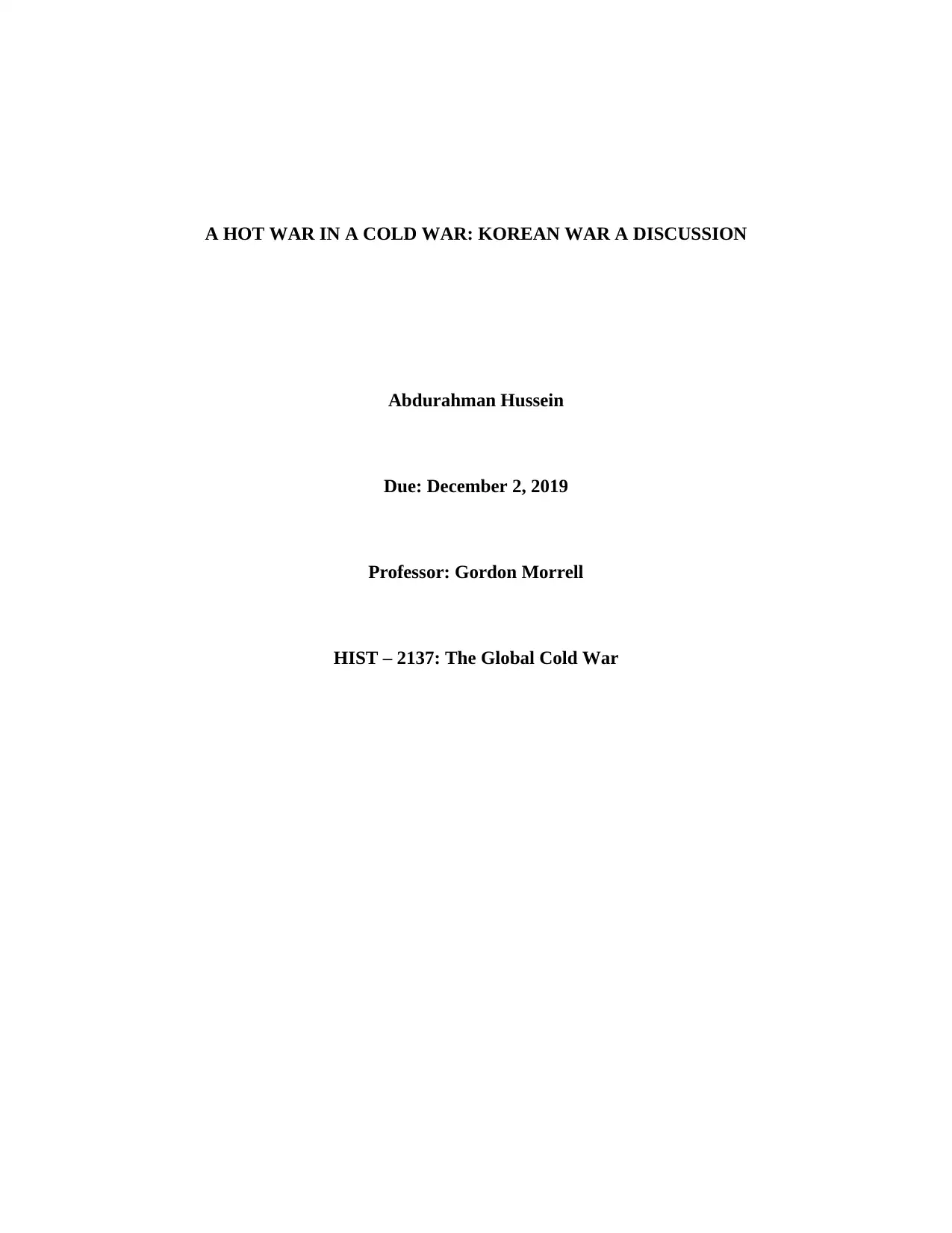
A HOT WAR IN A COLD WAR: KOREAN WAR A DISCUSSION
Abdurahman Hussein
Due: December 2, 2019
Professor: Gordon Morrell
HIST – 2137: The Global Cold War
Abdurahman Hussein
Due: December 2, 2019
Professor: Gordon Morrell
HIST – 2137: The Global Cold War
Paraphrase This Document
Need a fresh take? Get an instant paraphrase of this document with our AI Paraphraser
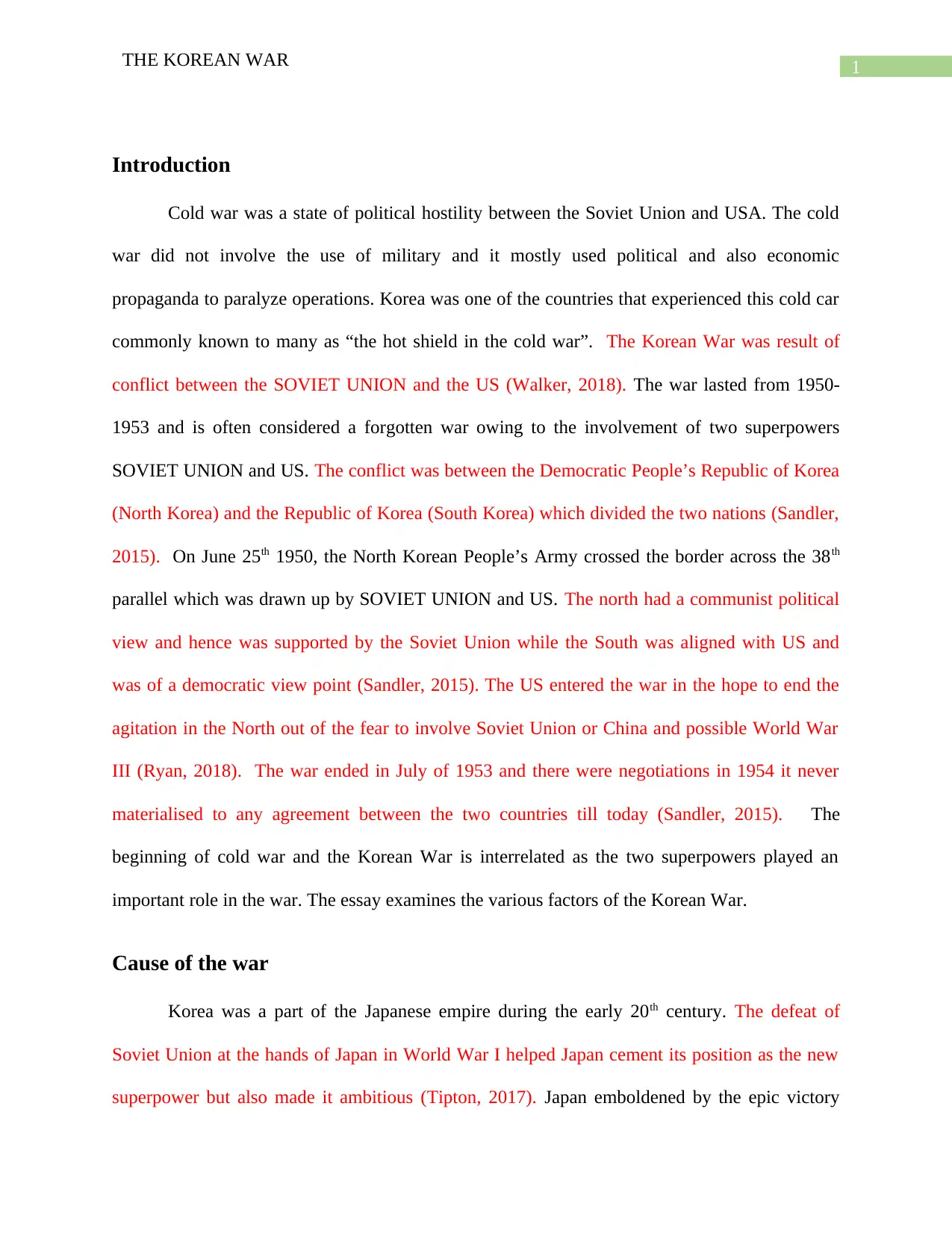
1THE KOREAN WAR
Introduction
Cold war was a state of political hostility between the Soviet Union and USA. The cold
war did not involve the use of military and it mostly used political and also economic
propaganda to paralyze operations. Korea was one of the countries that experienced this cold car
commonly known to many as “the hot shield in the cold war”. The Korean War was result of
conflict between the SOVIET UNION and the US (Walker, 2018). The war lasted from 1950-
1953 and is often considered a forgotten war owing to the involvement of two superpowers
SOVIET UNION and US. The conflict was between the Democratic People’s Republic of Korea
(North Korea) and the Republic of Korea (South Korea) which divided the two nations (Sandler,
2015). On June 25th 1950, the North Korean People’s Army crossed the border across the 38th
parallel which was drawn up by SOVIET UNION and US. The north had a communist political
view and hence was supported by the Soviet Union while the South was aligned with US and
was of a democratic view point (Sandler, 2015). The US entered the war in the hope to end the
agitation in the North out of the fear to involve Soviet Union or China and possible World War
III (Ryan, 2018). The war ended in July of 1953 and there were negotiations in 1954 it never
materialised to any agreement between the two countries till today (Sandler, 2015). The
beginning of cold war and the Korean War is interrelated as the two superpowers played an
important role in the war. The essay examines the various factors of the Korean War.
Cause of the war
Korea was a part of the Japanese empire during the early 20th century. The defeat of
Soviet Union at the hands of Japan in World War I helped Japan cement its position as the new
superpower but also made it ambitious (Tipton, 2017). Japan emboldened by the epic victory
Introduction
Cold war was a state of political hostility between the Soviet Union and USA. The cold
war did not involve the use of military and it mostly used political and also economic
propaganda to paralyze operations. Korea was one of the countries that experienced this cold car
commonly known to many as “the hot shield in the cold war”. The Korean War was result of
conflict between the SOVIET UNION and the US (Walker, 2018). The war lasted from 1950-
1953 and is often considered a forgotten war owing to the involvement of two superpowers
SOVIET UNION and US. The conflict was between the Democratic People’s Republic of Korea
(North Korea) and the Republic of Korea (South Korea) which divided the two nations (Sandler,
2015). On June 25th 1950, the North Korean People’s Army crossed the border across the 38th
parallel which was drawn up by SOVIET UNION and US. The north had a communist political
view and hence was supported by the Soviet Union while the South was aligned with US and
was of a democratic view point (Sandler, 2015). The US entered the war in the hope to end the
agitation in the North out of the fear to involve Soviet Union or China and possible World War
III (Ryan, 2018). The war ended in July of 1953 and there were negotiations in 1954 it never
materialised to any agreement between the two countries till today (Sandler, 2015). The
beginning of cold war and the Korean War is interrelated as the two superpowers played an
important role in the war. The essay examines the various factors of the Korean War.
Cause of the war
Korea was a part of the Japanese empire during the early 20th century. The defeat of
Soviet Union at the hands of Japan in World War I helped Japan cement its position as the new
superpower but also made it ambitious (Tipton, 2017). Japan emboldened by the epic victory
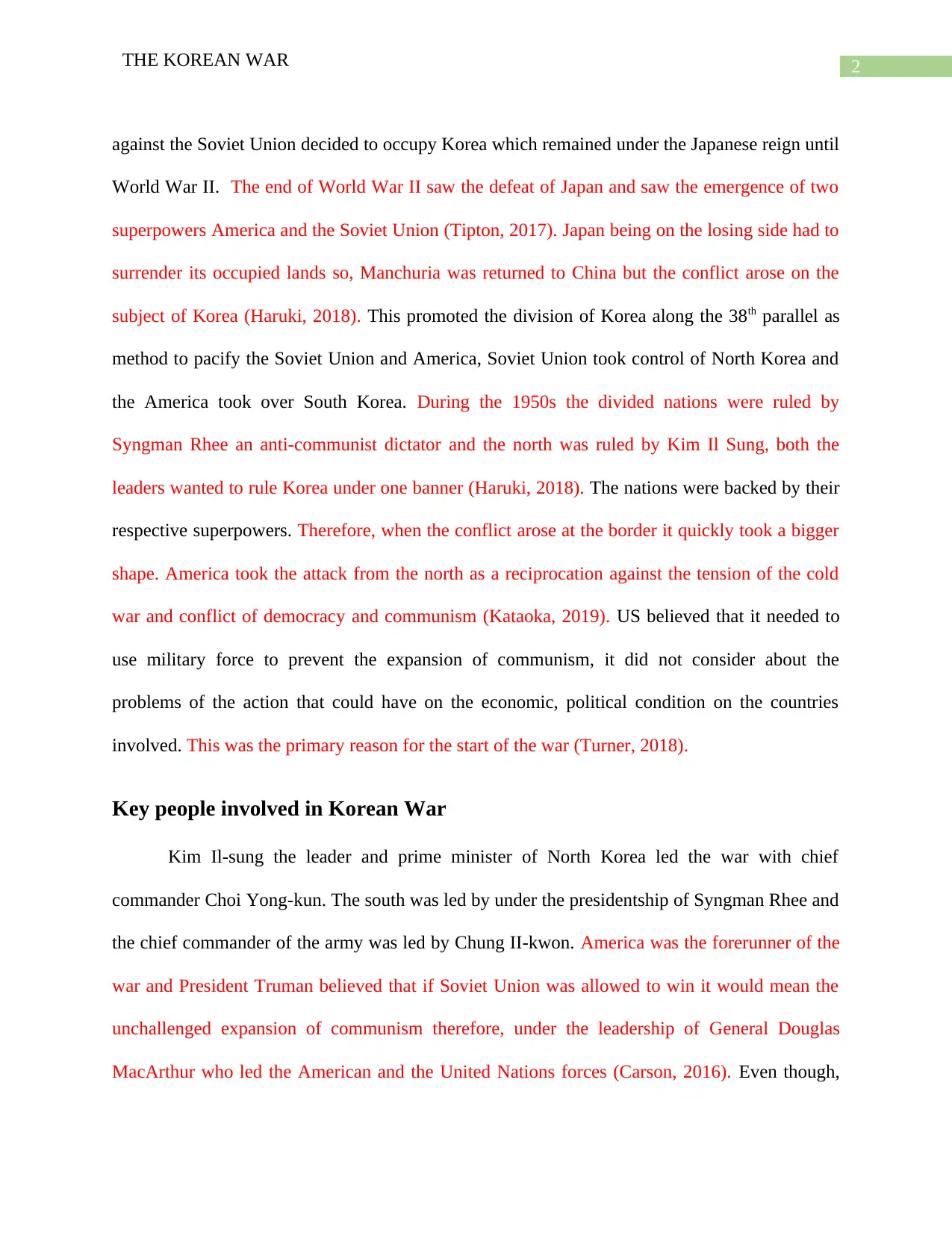
2THE KOREAN WAR
against the Soviet Union decided to occupy Korea which remained under the Japanese reign until
World War II. The end of World War II saw the defeat of Japan and saw the emergence of two
superpowers America and the Soviet Union (Tipton, 2017). Japan being on the losing side had to
surrender its occupied lands so, Manchuria was returned to China but the conflict arose on the
subject of Korea (Haruki, 2018). This promoted the division of Korea along the 38th parallel as
method to pacify the Soviet Union and America, Soviet Union took control of North Korea and
the America took over South Korea. During the 1950s the divided nations were ruled by
Syngman Rhee an anti-communist dictator and the north was ruled by Kim Il Sung, both the
leaders wanted to rule Korea under one banner (Haruki, 2018). The nations were backed by their
respective superpowers. Therefore, when the conflict arose at the border it quickly took a bigger
shape. America took the attack from the north as a reciprocation against the tension of the cold
war and conflict of democracy and communism (Kataoka, 2019). US believed that it needed to
use military force to prevent the expansion of communism, it did not consider about the
problems of the action that could have on the economic, political condition on the countries
involved. This was the primary reason for the start of the war (Turner, 2018).
Key people involved in Korean War
Kim Il-sung the leader and prime minister of North Korea led the war with chief
commander Choi Yong-kun. The south was led by under the presidentship of Syngman Rhee and
the chief commander of the army was led by Chung II-kwon. America was the forerunner of the
war and President Truman believed that if Soviet Union was allowed to win it would mean the
unchallenged expansion of communism therefore, under the leadership of General Douglas
MacArthur who led the American and the United Nations forces (Carson, 2016). Even though,
against the Soviet Union decided to occupy Korea which remained under the Japanese reign until
World War II. The end of World War II saw the defeat of Japan and saw the emergence of two
superpowers America and the Soviet Union (Tipton, 2017). Japan being on the losing side had to
surrender its occupied lands so, Manchuria was returned to China but the conflict arose on the
subject of Korea (Haruki, 2018). This promoted the division of Korea along the 38th parallel as
method to pacify the Soviet Union and America, Soviet Union took control of North Korea and
the America took over South Korea. During the 1950s the divided nations were ruled by
Syngman Rhee an anti-communist dictator and the north was ruled by Kim Il Sung, both the
leaders wanted to rule Korea under one banner (Haruki, 2018). The nations were backed by their
respective superpowers. Therefore, when the conflict arose at the border it quickly took a bigger
shape. America took the attack from the north as a reciprocation against the tension of the cold
war and conflict of democracy and communism (Kataoka, 2019). US believed that it needed to
use military force to prevent the expansion of communism, it did not consider about the
problems of the action that could have on the economic, political condition on the countries
involved. This was the primary reason for the start of the war (Turner, 2018).
Key people involved in Korean War
Kim Il-sung the leader and prime minister of North Korea led the war with chief
commander Choi Yong-kun. The south was led by under the presidentship of Syngman Rhee and
the chief commander of the army was led by Chung II-kwon. America was the forerunner of the
war and President Truman believed that if Soviet Union was allowed to win it would mean the
unchallenged expansion of communism therefore, under the leadership of General Douglas
MacArthur who led the American and the United Nations forces (Carson, 2016). Even though,
⊘ This is a preview!⊘
Do you want full access?
Subscribe today to unlock all pages.

Trusted by 1+ million students worldwide
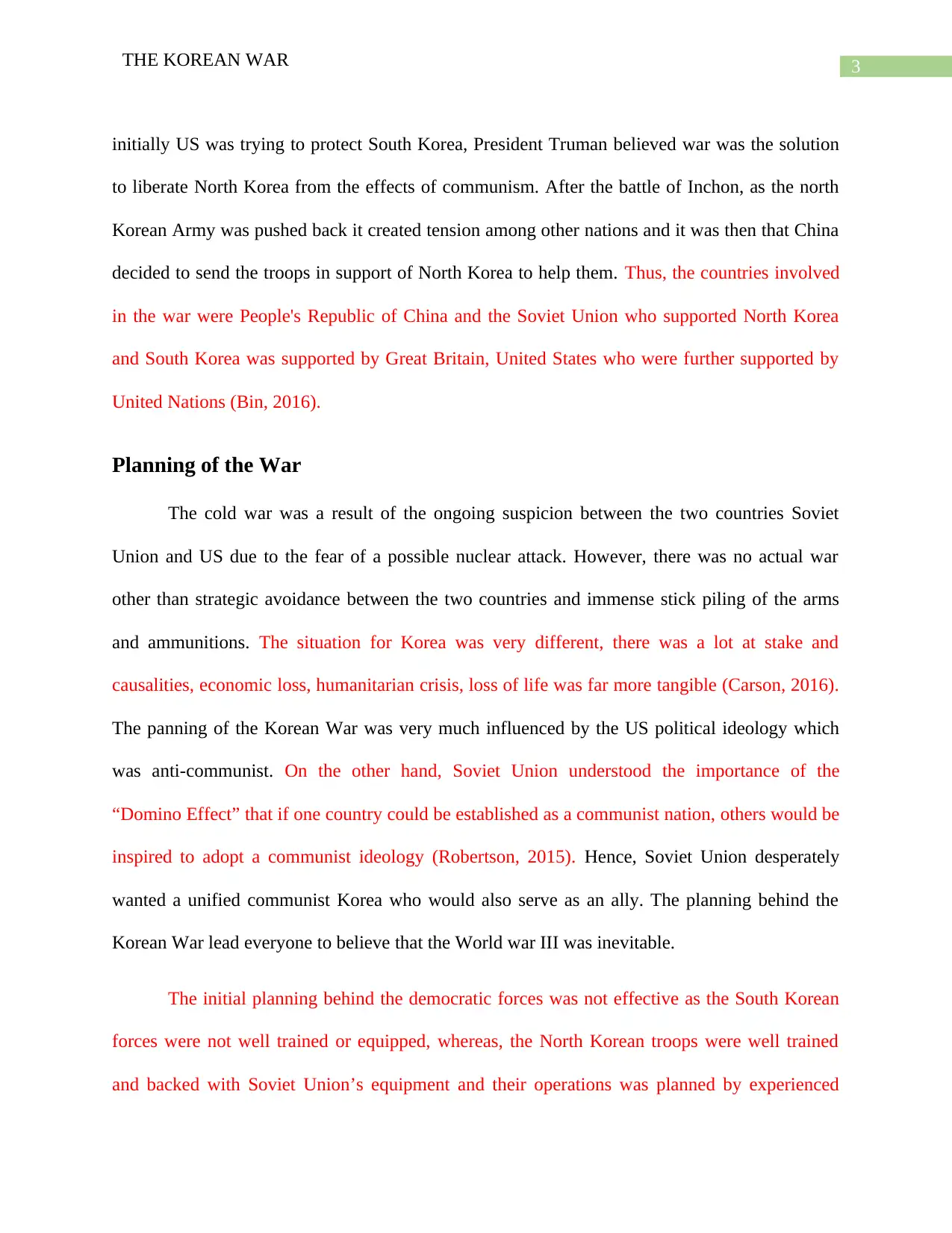
3THE KOREAN WAR
initially US was trying to protect South Korea, President Truman believed war was the solution
to liberate North Korea from the effects of communism. After the battle of Inchon, as the north
Korean Army was pushed back it created tension among other nations and it was then that China
decided to send the troops in support of North Korea to help them. Thus, the countries involved
in the war were People's Republic of China and the Soviet Union who supported North Korea
and South Korea was supported by Great Britain, United States who were further supported by
United Nations (Bin, 2016).
Planning of the War
The cold war was a result of the ongoing suspicion between the two countries Soviet
Union and US due to the fear of a possible nuclear attack. However, there was no actual war
other than strategic avoidance between the two countries and immense stick piling of the arms
and ammunitions. The situation for Korea was very different, there was a lot at stake and
causalities, economic loss, humanitarian crisis, loss of life was far more tangible (Carson, 2016).
The panning of the Korean War was very much influenced by the US political ideology which
was anti-communist. On the other hand, Soviet Union understood the importance of the
“Domino Effect” that if one country could be established as a communist nation, others would be
inspired to adopt a communist ideology (Robertson, 2015). Hence, Soviet Union desperately
wanted a unified communist Korea who would also serve as an ally. The planning behind the
Korean War lead everyone to believe that the World war III was inevitable.
The initial planning behind the democratic forces was not effective as the South Korean
forces were not well trained or equipped, whereas, the North Korean troops were well trained
and backed with Soviet Union’s equipment and their operations was planned by experienced
initially US was trying to protect South Korea, President Truman believed war was the solution
to liberate North Korea from the effects of communism. After the battle of Inchon, as the north
Korean Army was pushed back it created tension among other nations and it was then that China
decided to send the troops in support of North Korea to help them. Thus, the countries involved
in the war were People's Republic of China and the Soviet Union who supported North Korea
and South Korea was supported by Great Britain, United States who were further supported by
United Nations (Bin, 2016).
Planning of the War
The cold war was a result of the ongoing suspicion between the two countries Soviet
Union and US due to the fear of a possible nuclear attack. However, there was no actual war
other than strategic avoidance between the two countries and immense stick piling of the arms
and ammunitions. The situation for Korea was very different, there was a lot at stake and
causalities, economic loss, humanitarian crisis, loss of life was far more tangible (Carson, 2016).
The panning of the Korean War was very much influenced by the US political ideology which
was anti-communist. On the other hand, Soviet Union understood the importance of the
“Domino Effect” that if one country could be established as a communist nation, others would be
inspired to adopt a communist ideology (Robertson, 2015). Hence, Soviet Union desperately
wanted a unified communist Korea who would also serve as an ally. The planning behind the
Korean War lead everyone to believe that the World war III was inevitable.
The initial planning behind the democratic forces was not effective as the South Korean
forces were not well trained or equipped, whereas, the North Korean troops were well trained
and backed with Soviet Union’s equipment and their operations was planned by experienced
Paraphrase This Document
Need a fresh take? Get an instant paraphrase of this document with our AI Paraphraser
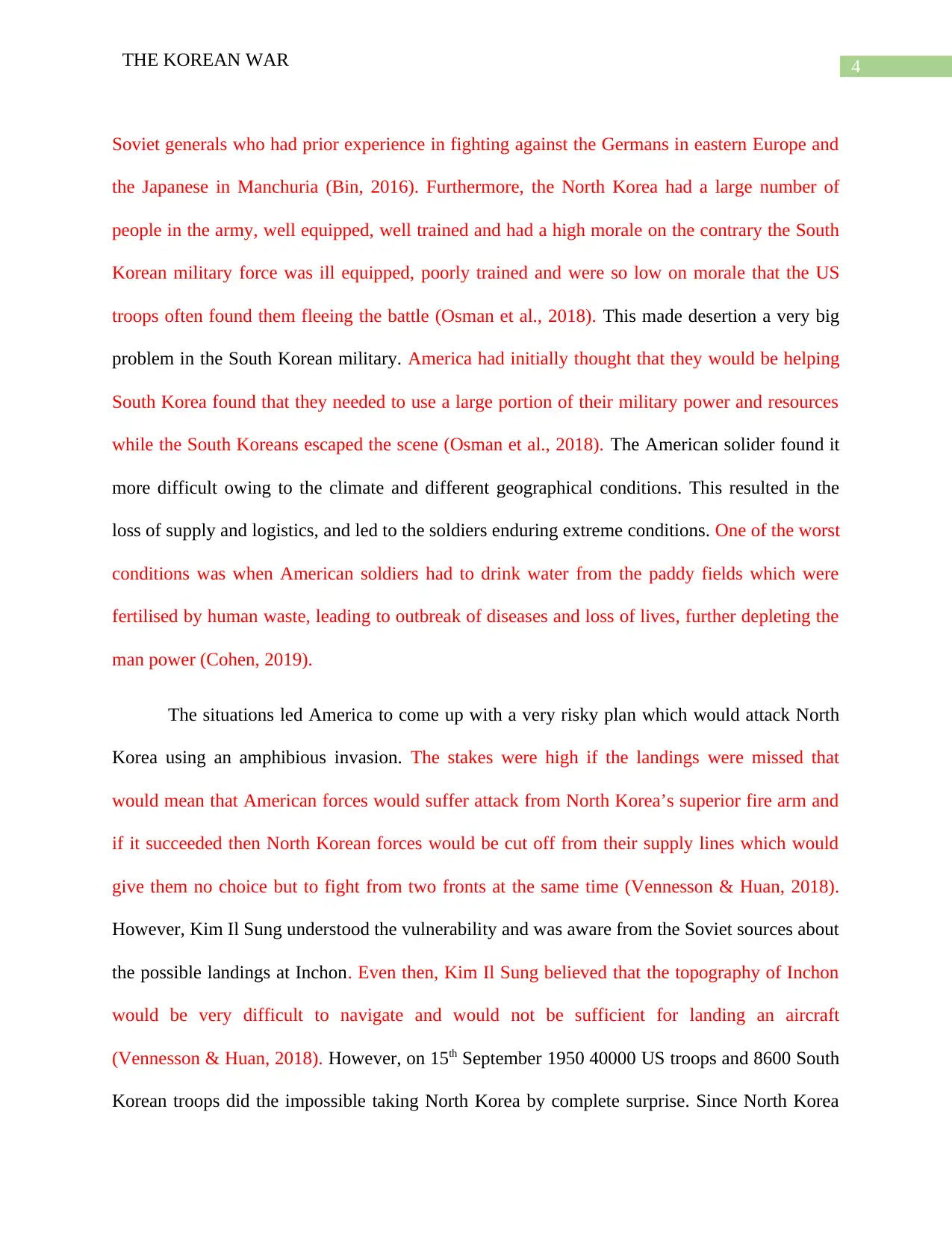
4THE KOREAN WAR
Soviet generals who had prior experience in fighting against the Germans in eastern Europe and
the Japanese in Manchuria (Bin, 2016). Furthermore, the North Korea had a large number of
people in the army, well equipped, well trained and had a high morale on the contrary the South
Korean military force was ill equipped, poorly trained and were so low on morale that the US
troops often found them fleeing the battle (Osman et al., 2018). This made desertion a very big
problem in the South Korean military. America had initially thought that they would be helping
South Korea found that they needed to use a large portion of their military power and resources
while the South Koreans escaped the scene (Osman et al., 2018). The American solider found it
more difficult owing to the climate and different geographical conditions. This resulted in the
loss of supply and logistics, and led to the soldiers enduring extreme conditions. One of the worst
conditions was when American soldiers had to drink water from the paddy fields which were
fertilised by human waste, leading to outbreak of diseases and loss of lives, further depleting the
man power (Cohen, 2019).
The situations led America to come up with a very risky plan which would attack North
Korea using an amphibious invasion. The stakes were high if the landings were missed that
would mean that American forces would suffer attack from North Korea’s superior fire arm and
if it succeeded then North Korean forces would be cut off from their supply lines which would
give them no choice but to fight from two fronts at the same time (Vennesson & Huan, 2018).
However, Kim Il Sung understood the vulnerability and was aware from the Soviet sources about
the possible landings at Inchon. Even then, Kim Il Sung believed that the topography of Inchon
would be very difficult to navigate and would not be sufficient for landing an aircraft
(Vennesson & Huan, 2018). However, on 15th September 1950 40000 US troops and 8600 South
Korean troops did the impossible taking North Korea by complete surprise. Since North Korea
Soviet generals who had prior experience in fighting against the Germans in eastern Europe and
the Japanese in Manchuria (Bin, 2016). Furthermore, the North Korea had a large number of
people in the army, well equipped, well trained and had a high morale on the contrary the South
Korean military force was ill equipped, poorly trained and were so low on morale that the US
troops often found them fleeing the battle (Osman et al., 2018). This made desertion a very big
problem in the South Korean military. America had initially thought that they would be helping
South Korea found that they needed to use a large portion of their military power and resources
while the South Koreans escaped the scene (Osman et al., 2018). The American solider found it
more difficult owing to the climate and different geographical conditions. This resulted in the
loss of supply and logistics, and led to the soldiers enduring extreme conditions. One of the worst
conditions was when American soldiers had to drink water from the paddy fields which were
fertilised by human waste, leading to outbreak of diseases and loss of lives, further depleting the
man power (Cohen, 2019).
The situations led America to come up with a very risky plan which would attack North
Korea using an amphibious invasion. The stakes were high if the landings were missed that
would mean that American forces would suffer attack from North Korea’s superior fire arm and
if it succeeded then North Korean forces would be cut off from their supply lines which would
give them no choice but to fight from two fronts at the same time (Vennesson & Huan, 2018).
However, Kim Il Sung understood the vulnerability and was aware from the Soviet sources about
the possible landings at Inchon. Even then, Kim Il Sung believed that the topography of Inchon
would be very difficult to navigate and would not be sufficient for landing an aircraft
(Vennesson & Huan, 2018). However, on 15th September 1950 40000 US troops and 8600 South
Korean troops did the impossible taking North Korea by complete surprise. Since North Korea
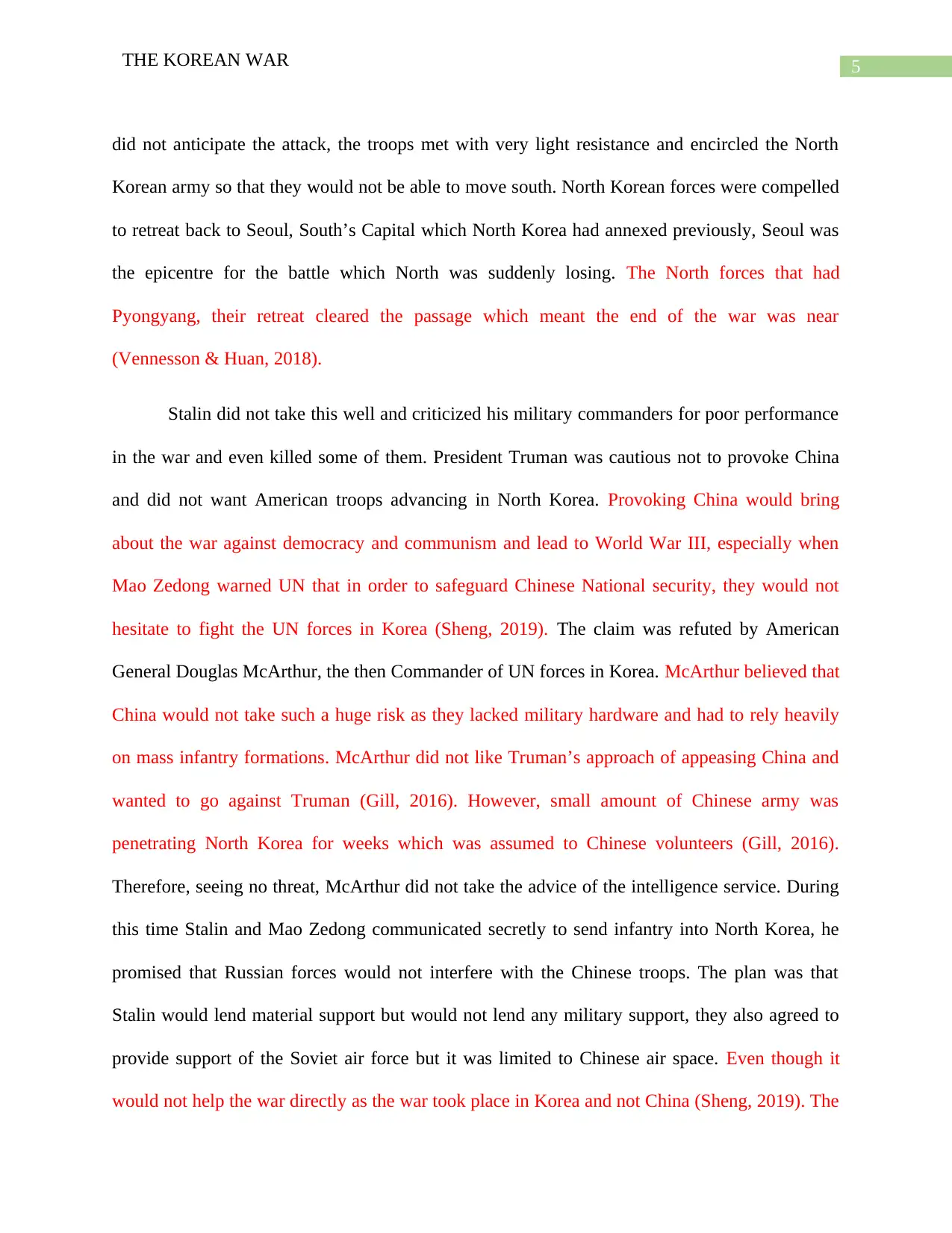
5THE KOREAN WAR
did not anticipate the attack, the troops met with very light resistance and encircled the North
Korean army so that they would not be able to move south. North Korean forces were compelled
to retreat back to Seoul, South’s Capital which North Korea had annexed previously, Seoul was
the epicentre for the battle which North was suddenly losing. The North forces that had
Pyongyang, their retreat cleared the passage which meant the end of the war was near
(Vennesson & Huan, 2018).
Stalin did not take this well and criticized his military commanders for poor performance
in the war and even killed some of them. President Truman was cautious not to provoke China
and did not want American troops advancing in North Korea. Provoking China would bring
about the war against democracy and communism and lead to World War III, especially when
Mao Zedong warned UN that in order to safeguard Chinese National security, they would not
hesitate to fight the UN forces in Korea (Sheng, 2019). The claim was refuted by American
General Douglas McArthur, the then Commander of UN forces in Korea. McArthur believed that
China would not take such a huge risk as they lacked military hardware and had to rely heavily
on mass infantry formations. McArthur did not like Truman’s approach of appeasing China and
wanted to go against Truman (Gill, 2016). However, small amount of Chinese army was
penetrating North Korea for weeks which was assumed to Chinese volunteers (Gill, 2016).
Therefore, seeing no threat, McArthur did not take the advice of the intelligence service. During
this time Stalin and Mao Zedong communicated secretly to send infantry into North Korea, he
promised that Russian forces would not interfere with the Chinese troops. The plan was that
Stalin would lend material support but would not lend any military support, they also agreed to
provide support of the Soviet air force but it was limited to Chinese air space. Even though it
would not help the war directly as the war took place in Korea and not China (Sheng, 2019). The
did not anticipate the attack, the troops met with very light resistance and encircled the North
Korean army so that they would not be able to move south. North Korean forces were compelled
to retreat back to Seoul, South’s Capital which North Korea had annexed previously, Seoul was
the epicentre for the battle which North was suddenly losing. The North forces that had
Pyongyang, their retreat cleared the passage which meant the end of the war was near
(Vennesson & Huan, 2018).
Stalin did not take this well and criticized his military commanders for poor performance
in the war and even killed some of them. President Truman was cautious not to provoke China
and did not want American troops advancing in North Korea. Provoking China would bring
about the war against democracy and communism and lead to World War III, especially when
Mao Zedong warned UN that in order to safeguard Chinese National security, they would not
hesitate to fight the UN forces in Korea (Sheng, 2019). The claim was refuted by American
General Douglas McArthur, the then Commander of UN forces in Korea. McArthur believed that
China would not take such a huge risk as they lacked military hardware and had to rely heavily
on mass infantry formations. McArthur did not like Truman’s approach of appeasing China and
wanted to go against Truman (Gill, 2016). However, small amount of Chinese army was
penetrating North Korea for weeks which was assumed to Chinese volunteers (Gill, 2016).
Therefore, seeing no threat, McArthur did not take the advice of the intelligence service. During
this time Stalin and Mao Zedong communicated secretly to send infantry into North Korea, he
promised that Russian forces would not interfere with the Chinese troops. The plan was that
Stalin would lend material support but would not lend any military support, they also agreed to
provide support of the Soviet air force but it was limited to Chinese air space. Even though it
would not help the war directly as the war took place in Korea and not China (Sheng, 2019). The
⊘ This is a preview!⊘
Do you want full access?
Subscribe today to unlock all pages.

Trusted by 1+ million students worldwide
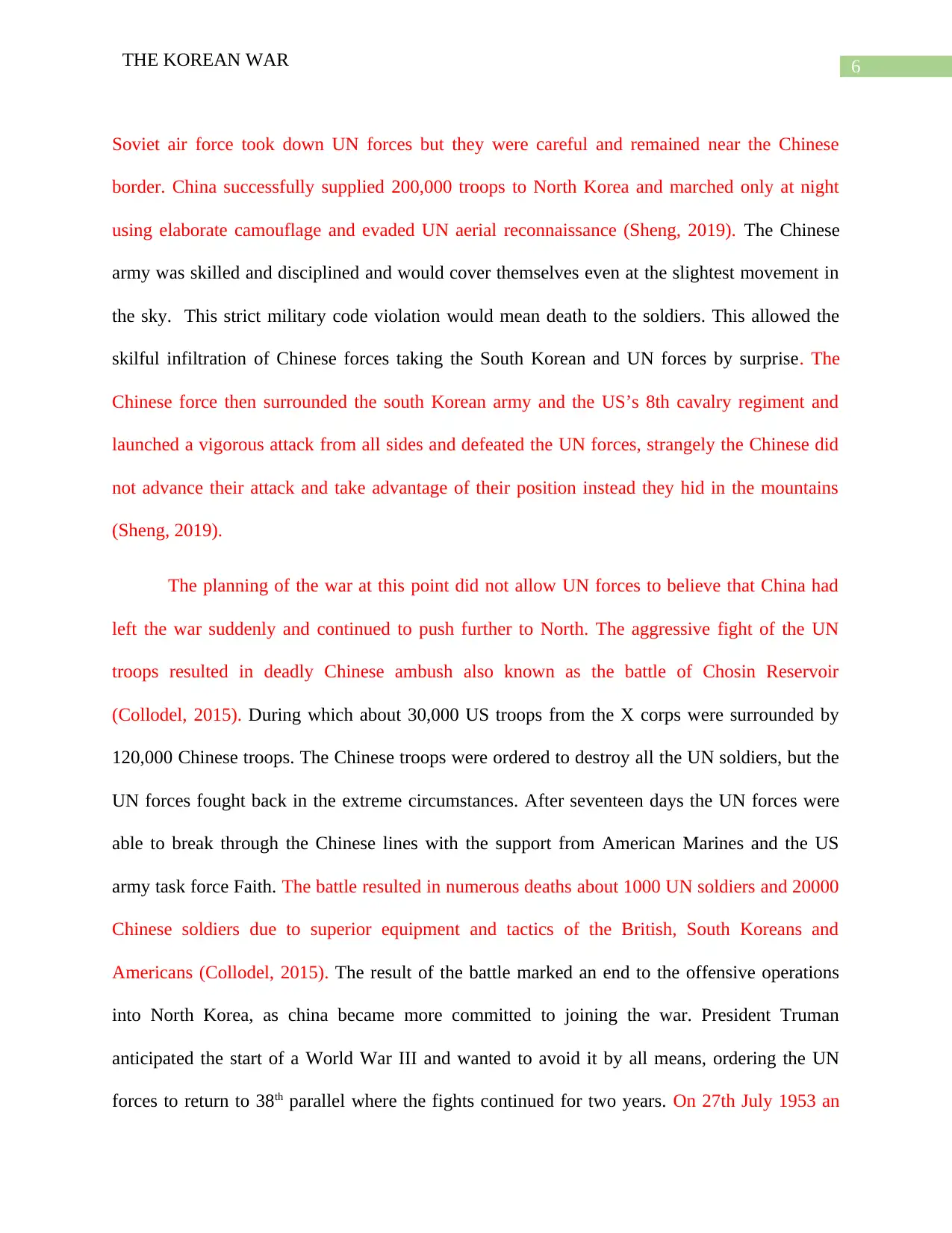
6THE KOREAN WAR
Soviet air force took down UN forces but they were careful and remained near the Chinese
border. China successfully supplied 200,000 troops to North Korea and marched only at night
using elaborate camouflage and evaded UN aerial reconnaissance (Sheng, 2019). The Chinese
army was skilled and disciplined and would cover themselves even at the slightest movement in
the sky. This strict military code violation would mean death to the soldiers. This allowed the
skilful infiltration of Chinese forces taking the South Korean and UN forces by surprise. The
Chinese force then surrounded the south Korean army and the US’s 8th cavalry regiment and
launched a vigorous attack from all sides and defeated the UN forces, strangely the Chinese did
not advance their attack and take advantage of their position instead they hid in the mountains
(Sheng, 2019).
The planning of the war at this point did not allow UN forces to believe that China had
left the war suddenly and continued to push further to North. The aggressive fight of the UN
troops resulted in deadly Chinese ambush also known as the battle of Chosin Reservoir
(Collodel, 2015). During which about 30,000 US troops from the X corps were surrounded by
120,000 Chinese troops. The Chinese troops were ordered to destroy all the UN soldiers, but the
UN forces fought back in the extreme circumstances. After seventeen days the UN forces were
able to break through the Chinese lines with the support from American Marines and the US
army task force Faith. The battle resulted in numerous deaths about 1000 UN soldiers and 20000
Chinese soldiers due to superior equipment and tactics of the British, South Koreans and
Americans (Collodel, 2015). The result of the battle marked an end to the offensive operations
into North Korea, as china became more committed to joining the war. President Truman
anticipated the start of a World War III and wanted to avoid it by all means, ordering the UN
forces to return to 38th parallel where the fights continued for two years. On 27th July 1953 an
Soviet air force took down UN forces but they were careful and remained near the Chinese
border. China successfully supplied 200,000 troops to North Korea and marched only at night
using elaborate camouflage and evaded UN aerial reconnaissance (Sheng, 2019). The Chinese
army was skilled and disciplined and would cover themselves even at the slightest movement in
the sky. This strict military code violation would mean death to the soldiers. This allowed the
skilful infiltration of Chinese forces taking the South Korean and UN forces by surprise. The
Chinese force then surrounded the south Korean army and the US’s 8th cavalry regiment and
launched a vigorous attack from all sides and defeated the UN forces, strangely the Chinese did
not advance their attack and take advantage of their position instead they hid in the mountains
(Sheng, 2019).
The planning of the war at this point did not allow UN forces to believe that China had
left the war suddenly and continued to push further to North. The aggressive fight of the UN
troops resulted in deadly Chinese ambush also known as the battle of Chosin Reservoir
(Collodel, 2015). During which about 30,000 US troops from the X corps were surrounded by
120,000 Chinese troops. The Chinese troops were ordered to destroy all the UN soldiers, but the
UN forces fought back in the extreme circumstances. After seventeen days the UN forces were
able to break through the Chinese lines with the support from American Marines and the US
army task force Faith. The battle resulted in numerous deaths about 1000 UN soldiers and 20000
Chinese soldiers due to superior equipment and tactics of the British, South Koreans and
Americans (Collodel, 2015). The result of the battle marked an end to the offensive operations
into North Korea, as china became more committed to joining the war. President Truman
anticipated the start of a World War III and wanted to avoid it by all means, ordering the UN
forces to return to 38th parallel where the fights continued for two years. On 27th July 1953 an
Paraphrase This Document
Need a fresh take? Get an instant paraphrase of this document with our AI Paraphraser
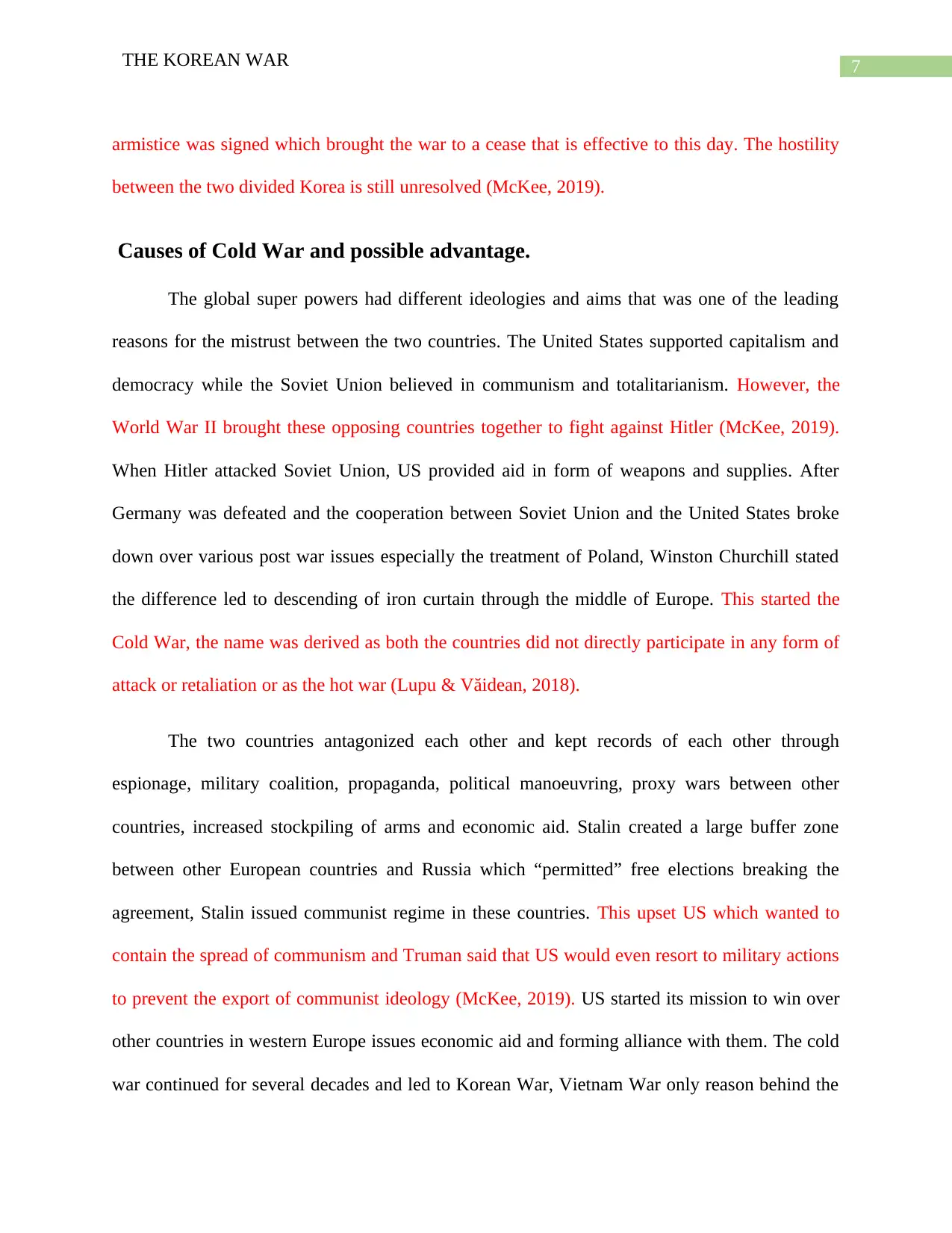
7THE KOREAN WAR
armistice was signed which brought the war to a cease that is effective to this day. The hostility
between the two divided Korea is still unresolved (McKee, 2019).
Causes of Cold War and possible advantage.
The global super powers had different ideologies and aims that was one of the leading
reasons for the mistrust between the two countries. The United States supported capitalism and
democracy while the Soviet Union believed in communism and totalitarianism. However, the
World War II brought these opposing countries together to fight against Hitler (McKee, 2019).
When Hitler attacked Soviet Union, US provided aid in form of weapons and supplies. After
Germany was defeated and the cooperation between Soviet Union and the United States broke
down over various post war issues especially the treatment of Poland, Winston Churchill stated
the difference led to descending of iron curtain through the middle of Europe. This started the
Cold War, the name was derived as both the countries did not directly participate in any form of
attack or retaliation or as the hot war (Lupu & Văidean, 2018).
The two countries antagonized each other and kept records of each other through
espionage, military coalition, propaganda, political manoeuvring, proxy wars between other
countries, increased stockpiling of arms and economic aid. Stalin created a large buffer zone
between other European countries and Russia which “permitted” free elections breaking the
agreement, Stalin issued communist regime in these countries. This upset US which wanted to
contain the spread of communism and Truman said that US would even resort to military actions
to prevent the export of communist ideology (McKee, 2019). US started its mission to win over
other countries in western Europe issues economic aid and forming alliance with them. The cold
war continued for several decades and led to Korean War, Vietnam War only reason behind the
armistice was signed which brought the war to a cease that is effective to this day. The hostility
between the two divided Korea is still unresolved (McKee, 2019).
Causes of Cold War and possible advantage.
The global super powers had different ideologies and aims that was one of the leading
reasons for the mistrust between the two countries. The United States supported capitalism and
democracy while the Soviet Union believed in communism and totalitarianism. However, the
World War II brought these opposing countries together to fight against Hitler (McKee, 2019).
When Hitler attacked Soviet Union, US provided aid in form of weapons and supplies. After
Germany was defeated and the cooperation between Soviet Union and the United States broke
down over various post war issues especially the treatment of Poland, Winston Churchill stated
the difference led to descending of iron curtain through the middle of Europe. This started the
Cold War, the name was derived as both the countries did not directly participate in any form of
attack or retaliation or as the hot war (Lupu & Văidean, 2018).
The two countries antagonized each other and kept records of each other through
espionage, military coalition, propaganda, political manoeuvring, proxy wars between other
countries, increased stockpiling of arms and economic aid. Stalin created a large buffer zone
between other European countries and Russia which “permitted” free elections breaking the
agreement, Stalin issued communist regime in these countries. This upset US which wanted to
contain the spread of communism and Truman said that US would even resort to military actions
to prevent the export of communist ideology (McKee, 2019). US started its mission to win over
other countries in western Europe issues economic aid and forming alliance with them. The cold
war continued for several decades and led to Korean War, Vietnam War only reason behind the
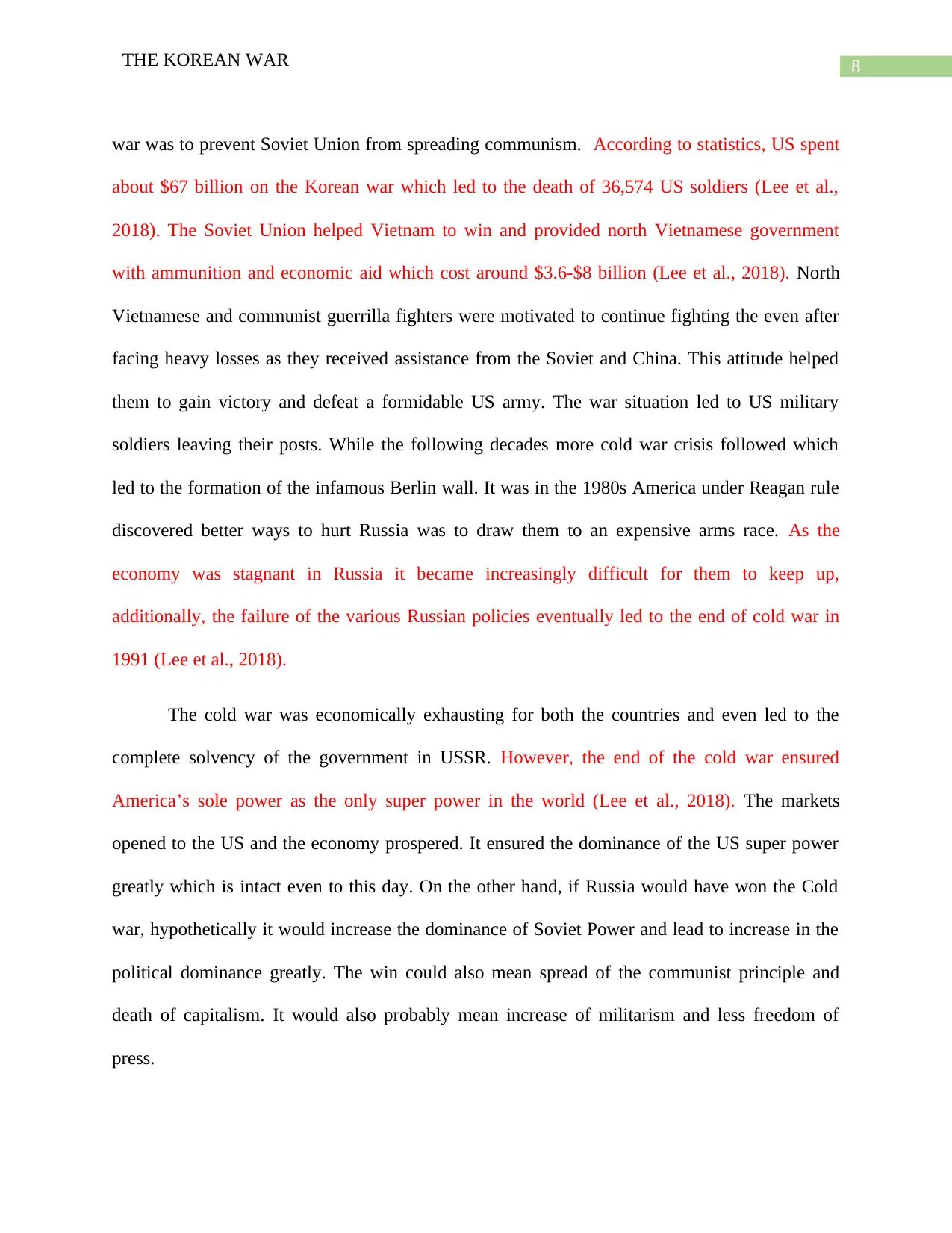
8THE KOREAN WAR
war was to prevent Soviet Union from spreading communism. According to statistics, US spent
about $67 billion on the Korean war which led to the death of 36,574 US soldiers (Lee et al.,
2018). The Soviet Union helped Vietnam to win and provided north Vietnamese government
with ammunition and economic aid which cost around $3.6-$8 billion (Lee et al., 2018). North
Vietnamese and communist guerrilla fighters were motivated to continue fighting the even after
facing heavy losses as they received assistance from the Soviet and China. This attitude helped
them to gain victory and defeat a formidable US army. The war situation led to US military
soldiers leaving their posts. While the following decades more cold war crisis followed which
led to the formation of the infamous Berlin wall. It was in the 1980s America under Reagan rule
discovered better ways to hurt Russia was to draw them to an expensive arms race. As the
economy was stagnant in Russia it became increasingly difficult for them to keep up,
additionally, the failure of the various Russian policies eventually led to the end of cold war in
1991 (Lee et al., 2018).
The cold war was economically exhausting for both the countries and even led to the
complete solvency of the government in USSR. However, the end of the cold war ensured
America’s sole power as the only super power in the world (Lee et al., 2018). The markets
opened to the US and the economy prospered. It ensured the dominance of the US super power
greatly which is intact even to this day. On the other hand, if Russia would have won the Cold
war, hypothetically it would increase the dominance of Soviet Power and lead to increase in the
political dominance greatly. The win could also mean spread of the communist principle and
death of capitalism. It would also probably mean increase of militarism and less freedom of
press.
war was to prevent Soviet Union from spreading communism. According to statistics, US spent
about $67 billion on the Korean war which led to the death of 36,574 US soldiers (Lee et al.,
2018). The Soviet Union helped Vietnam to win and provided north Vietnamese government
with ammunition and economic aid which cost around $3.6-$8 billion (Lee et al., 2018). North
Vietnamese and communist guerrilla fighters were motivated to continue fighting the even after
facing heavy losses as they received assistance from the Soviet and China. This attitude helped
them to gain victory and defeat a formidable US army. The war situation led to US military
soldiers leaving their posts. While the following decades more cold war crisis followed which
led to the formation of the infamous Berlin wall. It was in the 1980s America under Reagan rule
discovered better ways to hurt Russia was to draw them to an expensive arms race. As the
economy was stagnant in Russia it became increasingly difficult for them to keep up,
additionally, the failure of the various Russian policies eventually led to the end of cold war in
1991 (Lee et al., 2018).
The cold war was economically exhausting for both the countries and even led to the
complete solvency of the government in USSR. However, the end of the cold war ensured
America’s sole power as the only super power in the world (Lee et al., 2018). The markets
opened to the US and the economy prospered. It ensured the dominance of the US super power
greatly which is intact even to this day. On the other hand, if Russia would have won the Cold
war, hypothetically it would increase the dominance of Soviet Power and lead to increase in the
political dominance greatly. The win could also mean spread of the communist principle and
death of capitalism. It would also probably mean increase of militarism and less freedom of
press.
⊘ This is a preview!⊘
Do you want full access?
Subscribe today to unlock all pages.

Trusted by 1+ million students worldwide
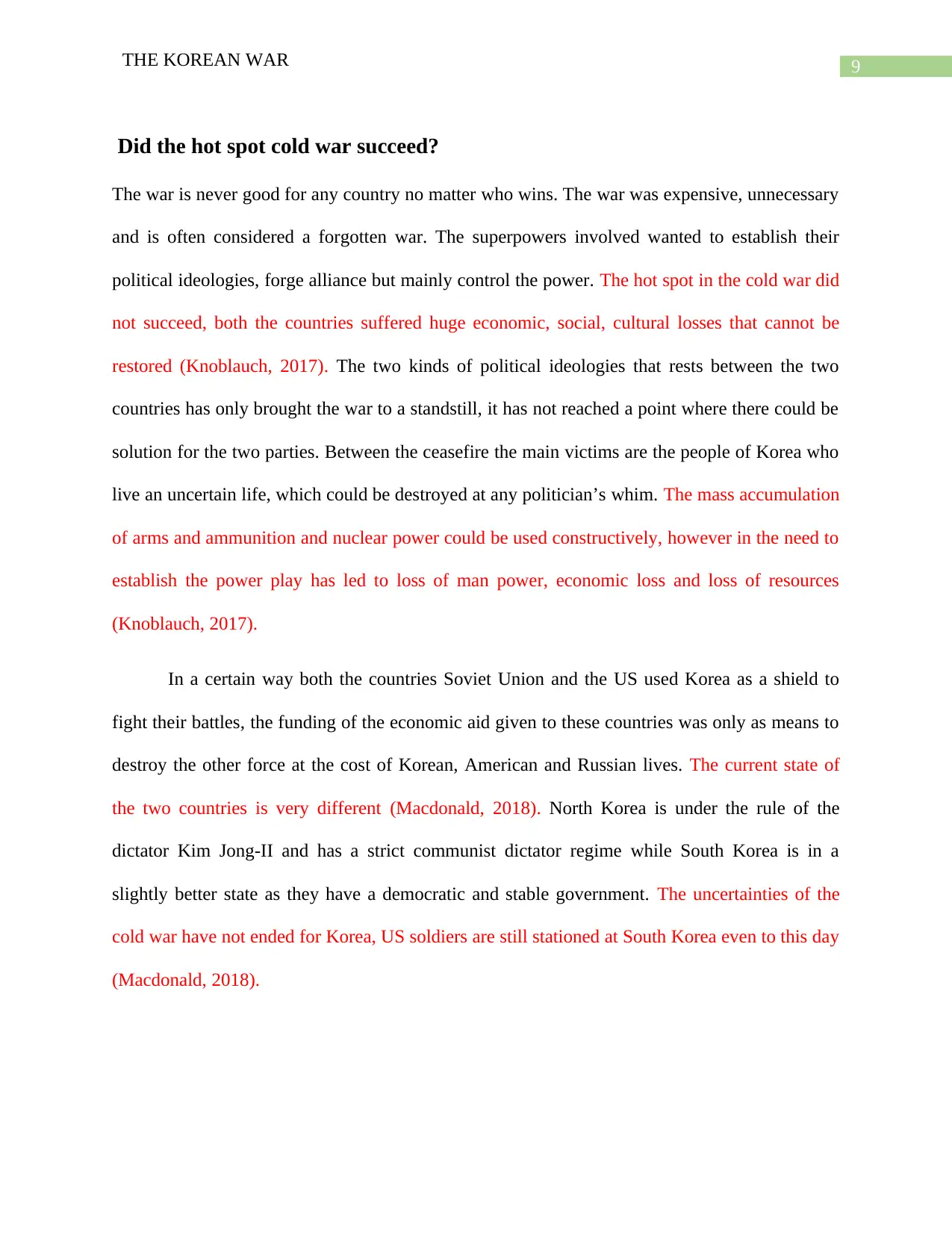
9THE KOREAN WAR
Did the hot spot cold war succeed?
The war is never good for any country no matter who wins. The war was expensive, unnecessary
and is often considered a forgotten war. The superpowers involved wanted to establish their
political ideologies, forge alliance but mainly control the power. The hot spot in the cold war did
not succeed, both the countries suffered huge economic, social, cultural losses that cannot be
restored (Knoblauch, 2017). The two kinds of political ideologies that rests between the two
countries has only brought the war to a standstill, it has not reached a point where there could be
solution for the two parties. Between the ceasefire the main victims are the people of Korea who
live an uncertain life, which could be destroyed at any politician’s whim. The mass accumulation
of arms and ammunition and nuclear power could be used constructively, however in the need to
establish the power play has led to loss of man power, economic loss and loss of resources
(Knoblauch, 2017).
In a certain way both the countries Soviet Union and the US used Korea as a shield to
fight their battles, the funding of the economic aid given to these countries was only as means to
destroy the other force at the cost of Korean, American and Russian lives. The current state of
the two countries is very different (Macdonald, 2018). North Korea is under the rule of the
dictator Kim Jong-II and has a strict communist dictator regime while South Korea is in a
slightly better state as they have a democratic and stable government. The uncertainties of the
cold war have not ended for Korea, US soldiers are still stationed at South Korea even to this day
(Macdonald, 2018).
Did the hot spot cold war succeed?
The war is never good for any country no matter who wins. The war was expensive, unnecessary
and is often considered a forgotten war. The superpowers involved wanted to establish their
political ideologies, forge alliance but mainly control the power. The hot spot in the cold war did
not succeed, both the countries suffered huge economic, social, cultural losses that cannot be
restored (Knoblauch, 2017). The two kinds of political ideologies that rests between the two
countries has only brought the war to a standstill, it has not reached a point where there could be
solution for the two parties. Between the ceasefire the main victims are the people of Korea who
live an uncertain life, which could be destroyed at any politician’s whim. The mass accumulation
of arms and ammunition and nuclear power could be used constructively, however in the need to
establish the power play has led to loss of man power, economic loss and loss of resources
(Knoblauch, 2017).
In a certain way both the countries Soviet Union and the US used Korea as a shield to
fight their battles, the funding of the economic aid given to these countries was only as means to
destroy the other force at the cost of Korean, American and Russian lives. The current state of
the two countries is very different (Macdonald, 2018). North Korea is under the rule of the
dictator Kim Jong-II and has a strict communist dictator regime while South Korea is in a
slightly better state as they have a democratic and stable government. The uncertainties of the
cold war have not ended for Korea, US soldiers are still stationed at South Korea even to this day
(Macdonald, 2018).
Paraphrase This Document
Need a fresh take? Get an instant paraphrase of this document with our AI Paraphraser
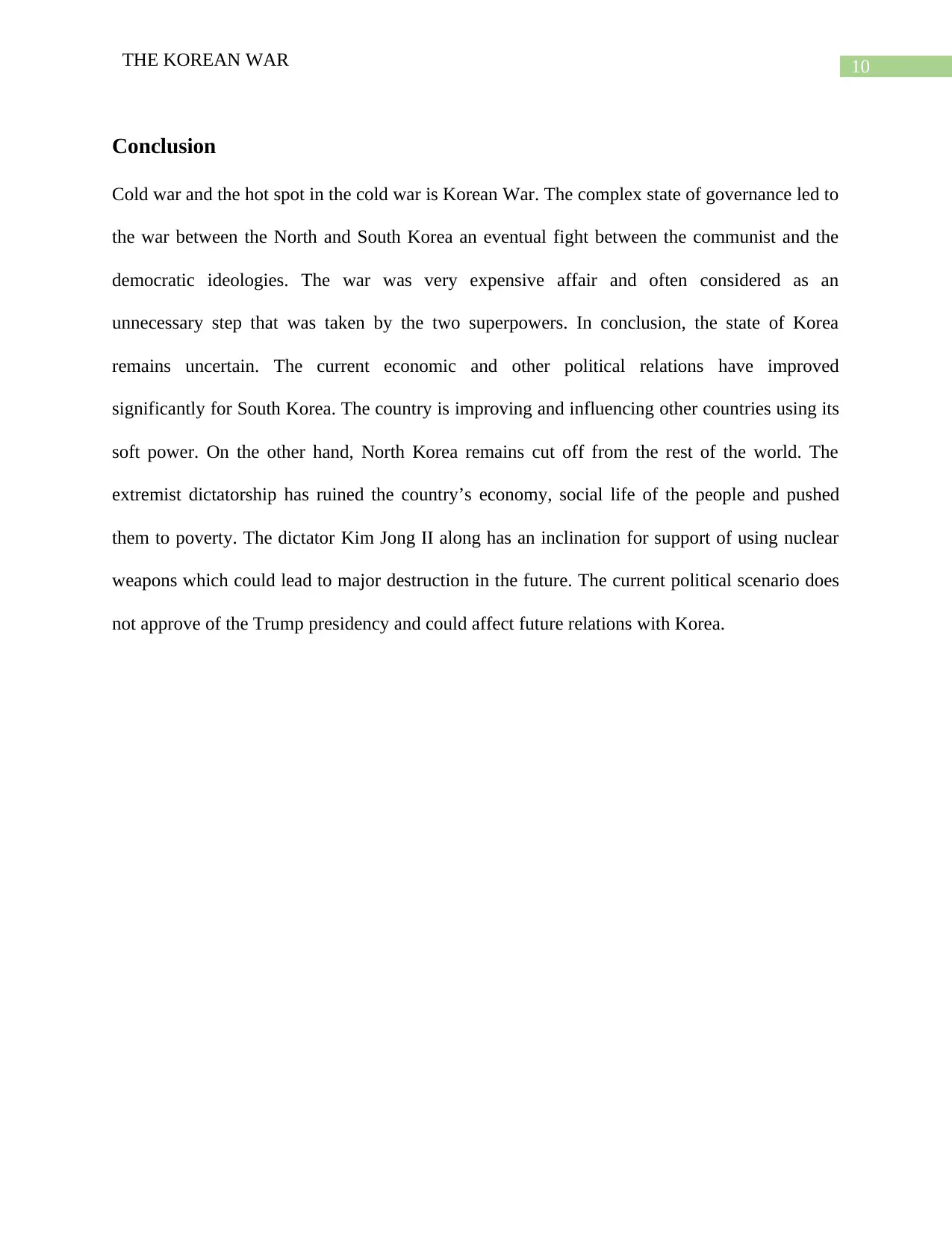
10THE KOREAN WAR
Conclusion
Cold war and the hot spot in the cold war is Korean War. The complex state of governance led to
the war between the North and South Korea an eventual fight between the communist and the
democratic ideologies. The war was very expensive affair and often considered as an
unnecessary step that was taken by the two superpowers. In conclusion, the state of Korea
remains uncertain. The current economic and other political relations have improved
significantly for South Korea. The country is improving and influencing other countries using its
soft power. On the other hand, North Korea remains cut off from the rest of the world. The
extremist dictatorship has ruined the country’s economy, social life of the people and pushed
them to poverty. The dictator Kim Jong II along has an inclination for support of using nuclear
weapons which could lead to major destruction in the future. The current political scenario does
not approve of the Trump presidency and could affect future relations with Korea.
Conclusion
Cold war and the hot spot in the cold war is Korean War. The complex state of governance led to
the war between the North and South Korea an eventual fight between the communist and the
democratic ideologies. The war was very expensive affair and often considered as an
unnecessary step that was taken by the two superpowers. In conclusion, the state of Korea
remains uncertain. The current economic and other political relations have improved
significantly for South Korea. The country is improving and influencing other countries using its
soft power. On the other hand, North Korea remains cut off from the rest of the world. The
extremist dictatorship has ruined the country’s economy, social life of the people and pushed
them to poverty. The dictator Kim Jong II along has an inclination for support of using nuclear
weapons which could lead to major destruction in the future. The current political scenario does
not approve of the Trump presidency and could affect future relations with Korea.
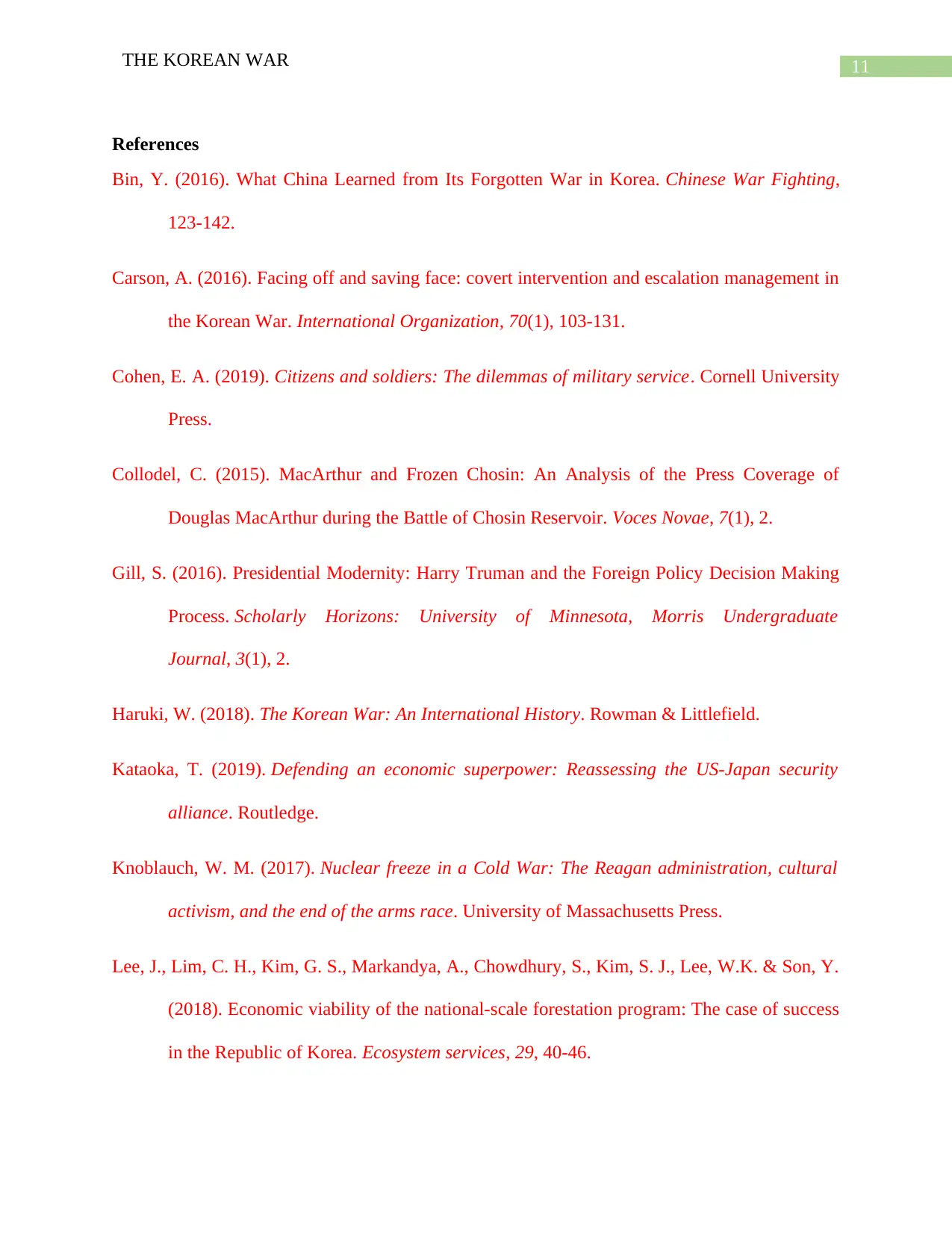
11THE KOREAN WAR
References
Bin, Y. (2016). What China Learned from Its Forgotten War in Korea. Chinese War Fighting,
123-142.
Carson, A. (2016). Facing off and saving face: covert intervention and escalation management in
the Korean War. International Organization, 70(1), 103-131.
Cohen, E. A. (2019). Citizens and soldiers: The dilemmas of military service. Cornell University
Press.
Collodel, C. (2015). MacArthur and Frozen Chosin: An Analysis of the Press Coverage of
Douglas MacArthur during the Battle of Chosin Reservoir. Voces Novae, 7(1), 2.
Gill, S. (2016). Presidential Modernity: Harry Truman and the Foreign Policy Decision Making
Process. Scholarly Horizons: University of Minnesota, Morris Undergraduate
Journal, 3(1), 2.
Haruki, W. (2018). The Korean War: An International History. Rowman & Littlefield.
Kataoka, T. (2019). Defending an economic superpower: Reassessing the US-Japan security
alliance. Routledge.
Knoblauch, W. M. (2017). Nuclear freeze in a Cold War: The Reagan administration, cultural
activism, and the end of the arms race. University of Massachusetts Press.
Lee, J., Lim, C. H., Kim, G. S., Markandya, A., Chowdhury, S., Kim, S. J., Lee, W.K. & Son, Y.
(2018). Economic viability of the national-scale forestation program: The case of success
in the Republic of Korea. Ecosystem services, 29, 40-46.
References
Bin, Y. (2016). What China Learned from Its Forgotten War in Korea. Chinese War Fighting,
123-142.
Carson, A. (2016). Facing off and saving face: covert intervention and escalation management in
the Korean War. International Organization, 70(1), 103-131.
Cohen, E. A. (2019). Citizens and soldiers: The dilemmas of military service. Cornell University
Press.
Collodel, C. (2015). MacArthur and Frozen Chosin: An Analysis of the Press Coverage of
Douglas MacArthur during the Battle of Chosin Reservoir. Voces Novae, 7(1), 2.
Gill, S. (2016). Presidential Modernity: Harry Truman and the Foreign Policy Decision Making
Process. Scholarly Horizons: University of Minnesota, Morris Undergraduate
Journal, 3(1), 2.
Haruki, W. (2018). The Korean War: An International History. Rowman & Littlefield.
Kataoka, T. (2019). Defending an economic superpower: Reassessing the US-Japan security
alliance. Routledge.
Knoblauch, W. M. (2017). Nuclear freeze in a Cold War: The Reagan administration, cultural
activism, and the end of the arms race. University of Massachusetts Press.
Lee, J., Lim, C. H., Kim, G. S., Markandya, A., Chowdhury, S., Kim, S. J., Lee, W.K. & Son, Y.
(2018). Economic viability of the national-scale forestation program: The case of success
in the Republic of Korea. Ecosystem services, 29, 40-46.
⊘ This is a preview!⊘
Do you want full access?
Subscribe today to unlock all pages.

Trusted by 1+ million students worldwide
1 out of 14
Related Documents
Your All-in-One AI-Powered Toolkit for Academic Success.
+13062052269
info@desklib.com
Available 24*7 on WhatsApp / Email
![[object Object]](/_next/static/media/star-bottom.7253800d.svg)
Unlock your academic potential
Copyright © 2020–2026 A2Z Services. All Rights Reserved. Developed and managed by ZUCOL.





